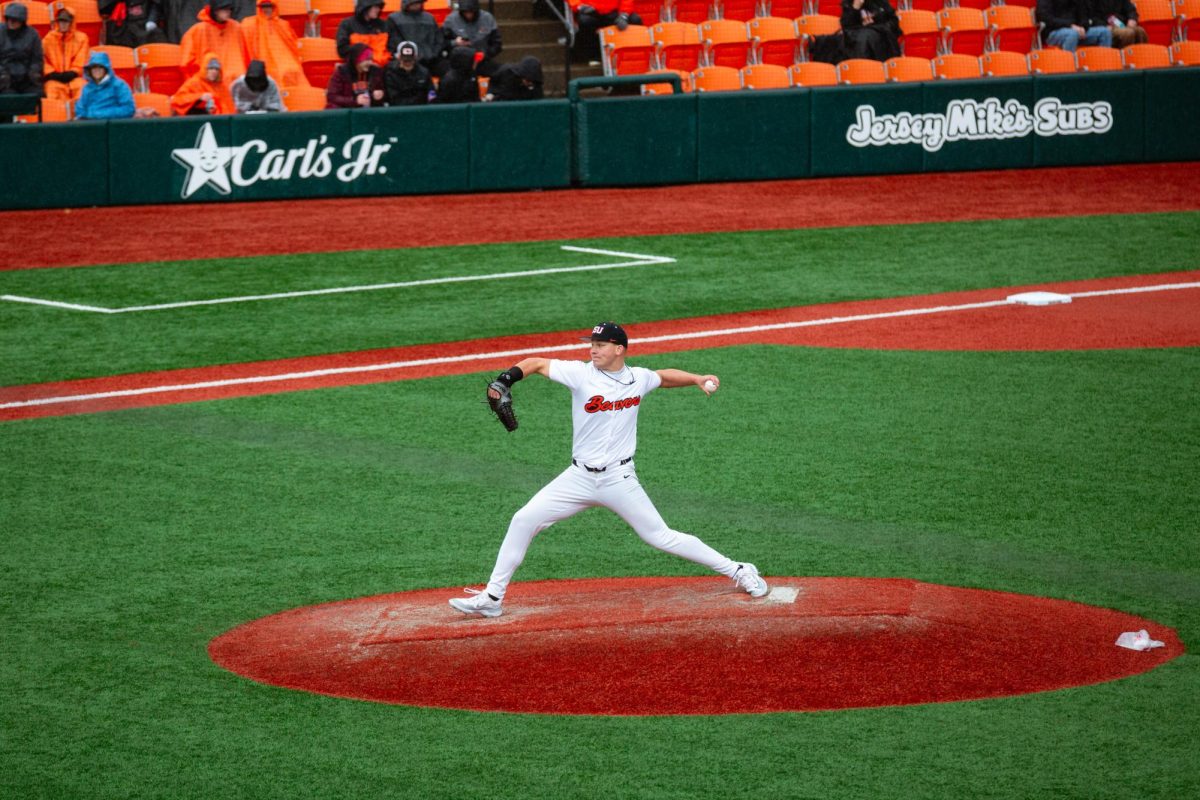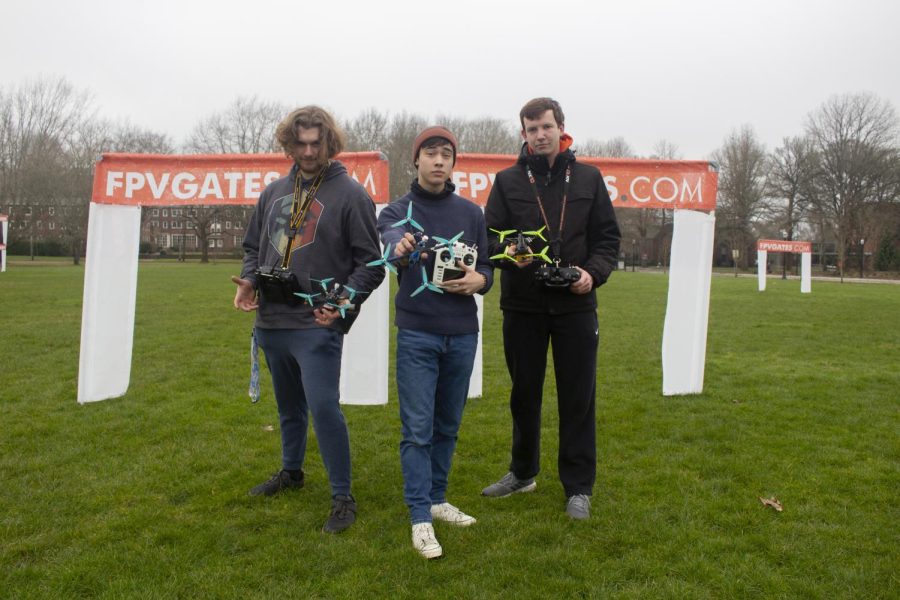Oregon State drone racing team looks forward in preparation for national competition in Atlanta
Drone pilots Logan Snell (he/him) (left), Josh Lizee (they/them) (middle), and Felix Klein (he/him) (right) pose for a photo with their drones on Feb. 12 in the Peavy Fields at Oregon State University in Corvallis. The drone pilots will be competing in the annual Collegiate Drone Racing Association at Georgia Tech on April 1.
March 6, 2023
The drone racing team from Oregon State University is set to travel to Atlanta, Georgia to compete in a national competition that begins on April 1.
Four OSU pilots from the drone racing team qualified for the 2023 Collegiate Drone Racing Championship, and will be the only competition there representing a college in the Pacific Northwest.
Though a team of drone pilots at OSU competed in the 2022 CDRC in North Dakota, Adam Krivoshein, the drone racing lead, anticipates a better showing at this year’s championship which will be held at Georgia Institute of Technology.
“Last year, we only had a couple of pilots who were able to be competitive, but this year, we have some people who are really putting in the time, putting in the effort,” said Adam Krivoshein, a third-year computer science major.
The CDRC national competition is a two-day competition, where select pilots bring their fastest drones to maneuver through a racetrack. In preparation for the competition, the OSU pilots spend hours first building and perfecting their carbon fiber drones, and then race them through practice courses, which consist of spaced-out five-by-five-foot hooplike gates in open grass areas.
Krivoshein and the other pilots — Felix Klein, Josh Lizee and Logan Snell — submitted their fastest times to the Collegiate Drone Racing Association to qualify for the competition, and are now working to break their own personal records in practice before they compete.
The type of drone racing OSU will compete in at CDRC is First Person View, where cameras on the front of each drone project real time video feed to the goggles of its pilot.
“It’s like having a big TV two feet in front of you,” said Lizee, a first-year that has been flying drones for years prior to joining the OSU team.
As a self-proclaimed “big aviation nerd,” Klein, a second-year mechanical engineer, enjoys racing drones because the goggles create the illusion of piloting a plane.
“It’s really immersive,” Klein said. “It’s also super safe for myself, because I’m not actually flying, but I feel like I’m flying.”
The drone racing team is a subdivision of the OSU robotics club, which will pay for the four pilots’ room, board and transportation to Atlanta. The pilots, though, had to make an investment to reach the point of qualification.
“The cost of entry (into drone racing) can be like $1000 plus…for things like your radio, the goggles, your batteries and all that,” Klein said. “The drones, individually, are usually between $250 to $400, depending on how high-end you want to go.”
Klein explained how even an experienced pilot runs the risk of crashing their drones, causing them to invest even more to replace them.
“Once you get real good (at flying) though, you start destroying (drones) in different ways, like overloading electronics and stuff like that, because you’re pushing them really hard,” Klein said. “You have to find that sweet middle ground between getting really fast, but not just absolutely destroying your motors, your speed control regulators and stuff like that.”
According to Lizee, drones can suffer collisions into practice gates at speeds of 100 to 120 miles per hour, too, which is why many hours are spent by the pilots using a drone racing simulator on their computers as well.
But, for Krivoshein, being a part of the OSU drone racing team is much more than the money and the competition.
“I really value how the club (makes) a community for people to come together,” Krivoshein said. “I’d never been able to fly with other people or share my hobby.”


















































































![Newspaper clipping from February 25, 1970 in the Daily Barometer showing an article written by Bob Allen, past Barometer Editor. This article was written to spotlight both the student body’s lack of participation with student government at the time in conjunction with their class representatives response. [It’s important to note ASOSU was not structured identically to today’s standards, likely having a president on behalf of each class work together as one entity as opposed to one president representing all classes.]](https://dailybaro.orangemedianetwork.com/wp-content/uploads/2025/03/Screenshot-2025-03-12-1.00.42-PM-e1741811160853.png)
























